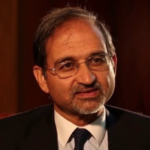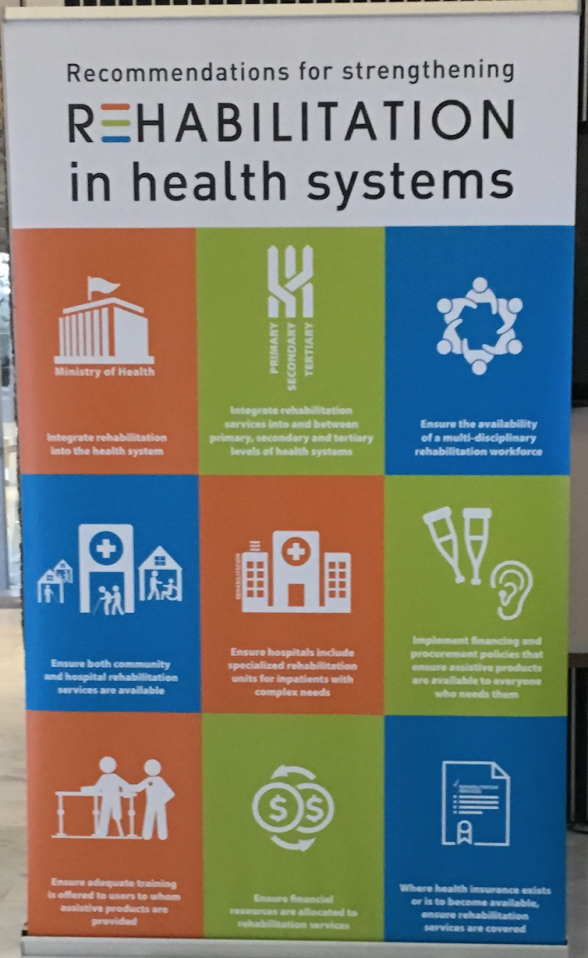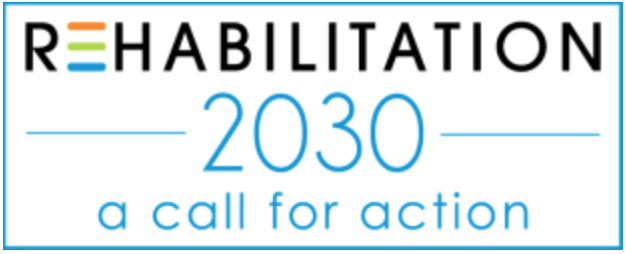On Monday and Tuesday of this week, I attended the WHO meeting in Geneva, REHABILITATION 2030: a call to action. Download the full call to action here: REHABILITATION 2030- A Call For Action, and follow this link to download a number of other background papers if you are interested.
Introduction
This meeting was the first of its kind focused on rehabilitation, similar to the First Ministerial Conference on Dementia held in March 2015, where I placed rehabilitation for dementia onto the global stage in my keynote speech. Everyone, including people with dementia have the right to rehabilitation. There were well over 200 people in attendance in the Executive Board room, representing organisations and almost all types or causes of disabilities from all around the world. I'd guess it was the first time dementia has been represented at a special rehabilitation event like this.
After introductions on Day 1 by Dr Krug on the importance of rehabilitation for all, he stated that we all must bring this topic into the political arena, as without change in policy, little will happen. He also talked briefly of the need to fully integrate rehabilitation into health care systems globally.
Following this, we watched a short film, with a very clear and strong message that;
"Everyone must be able to access available, and affordable rehabilitation services."
I have many pages of notes from the two days, but feel rather than overload (or bore) you, there will be a s series of blogs covering the two day meeting over the next few weeks, commencing with here with Blog #1.
Early on Day 1, we heard three testimonies from people living with disabilities, who, without rehabilitation, would not be living productive and meaningful lives today. These are the notes I took from these powerful testimonies:
Three personal testimonies:
1. Dr Rita Sadana
Rita works at the WHO, discussed why rehabilitation is essential. Cycling was a passion and also how she met her husband – but an accident with a car caused her severe spinal injuries, paralysed her, and caused many other medical problems. Basically, she said, she has been reconstructed, and is lucky to be back at work.
She says to people who tell her she is a miracle, but that it is not a miracle, but mostly due to full and authentic package of rehabilitation!
Family and friends and colleagues also important, but motivation and never give up attitude is what has helped as much as rehab. The result was a ‘new me’ but allowing her to live beyond her paralysis and other critical injuries – without it, she would still be like a robot, unable to walk properly, work, function and have a good life. She chose a holistic path for pain, instead of the addictive drugs; rehab has a huge impact, with immense value. Finally, she stated:
“Rehabilitation gave me a second life worth living.”
2. Dr Gopal Mitra
Works at UNICEF as a program specialist. He became blind in his late 20’s due to an explosion – rehabilitated, but still a very difficult journey. From a small lower SES small town in India, he says he was luckier than many other Indians, which was simply due to care and services being arranged by himself, not the health system. Support of family and friends was CRUCIAL, and even medical doctors do not know what is available; there was a lot os trial and error, and he found out through others living with disabilities, not the health system what was available. It was the only way he achieved, as there are no services. On top of that, all services in India are urban centric, even though most people live in rural communities, not the cities. Also, the quality of services was poor, e.g. given a shorter cane, simply because one for someone tall was not available – causing the chronic backache!
He was told “To forget everything as you are blind now”, and you can do things like basket weaving instead of living your life!! He was very angry and said he wanted to tell them to shove the basket… He was also told it would be 5 years before services, just in case his sight came back – he took out his eye and said, do you think this will grow back!
Things must change – his own experiences of rehabilitation and services was self sought and fought for, and costly. Most with disabilities live in poverty – he was lucky he had funds, and some support from his employer. System structures must be set up to make it affordable for all. Finally, he said, which I thought was the quote for the two days:
"Leaving no one behind, does not mean, leaving almost no one behind!”
3. Ms Cheat Sohka
She is the Executive Director of the Association of Spinal cord injury in Cambodia, which she established in 2012. Ms Sohka became a paraplegic during the civil war in Cambodia; at that time, no rehabilitation, no medical support, and the situation was getting much worse. Her family took her to the rehabilitation camp, and pushed hard for a humanitarian pathway.
She needed her family to earn money to support her rehabilitation and the equipment required, of which none was provided by health system in Cambodia. Finally, she said:
"Rehabilitation taught me to see a future, and that it was possible to continue to live and contribute to society."
These were indeed three very powerful testimonies, and I have little doubt there will be many people diagnosed with dementia who will, as I did, relate to them. It has almost certainly been the self prescribed rehabilitation and lifestyle changes, that have allowed me to slow the progression of my own dementia.
Representing DAI
I was there in my capacity as one of eight co-founders, Chair and CEO of DAI, representing all members of Dementia Alliance International, and in reality, all people with dementia globally. There was no opportunity at the meeting to make a formal statement, although we had the opportunity to respond to three questions prior to the event. You can see our statement here:
As this is Part 1 of a blog series about rehabilitation and dementia, I will mention that there was however, only one opportunity to ask a question which was on Day 2, so I put the DAI sign up and was invited to speak. My question to the panel was this:
"How well will dementia and rehabilitation be focused on and how will we ensure people with dementia receive rehabilitation?"
 Dr Shakhar Saxena, the Director of the Department of Mental Health and Substance Abuse at the WHO, answered very positively. He stated that we will all need to wait until the Global Action Plan for Dementia is accepted, but that if it is accepted (we all expect it to be), then he is confident it will be taken seriously. He said the WHO want to start a public campaign to remove the misconceptions around dementia [as DAI has begun], but additionally, the WHO will be collecting information from countries to find out what they are doing, and use the Global Dementia Observatory to pull together the data. Dr Sazena stated clearly the WHO will be relying on DAI to assist with this, as we are proving it can be done, and rehabilitation is very useful to enable us to live good lives for longer, as well as contribute significantly to society.
Dr Shakhar Saxena, the Director of the Department of Mental Health and Substance Abuse at the WHO, answered very positively. He stated that we will all need to wait until the Global Action Plan for Dementia is accepted, but that if it is accepted (we all expect it to be), then he is confident it will be taken seriously. He said the WHO want to start a public campaign to remove the misconceptions around dementia [as DAI has begun], but additionally, the WHO will be collecting information from countries to find out what they are doing, and use the Global Dementia Observatory to pull together the data. Dr Sazena stated clearly the WHO will be relying on DAI to assist with this, as we are proving it can be done, and rehabilitation is very useful to enable us to live good lives for longer, as well as contribute significantly to society.
Marc Wortmann, CEO of our close partners, Alzheimer's Disease International, sitting next to me, and I were both very happy with this response.
It is obvious, when the conclusion of the Organisation for Economic Cooperation and Development[i], based on an exhaustive study of the world’s 38 richest countries is that “Dementia receives the worst care in the developed world”, that this is unacceptable.
It now seems clear that rehabilitation and proactive disability support for all newly diagnosed people with dementia has the greatest potential to change that. DAI is showing this by example of its members are living meaningful and significantly productive lives. There is also much emerging evidence showing it is possible to slow down and even reverse cognitive decline in some types of dementia, when diagnosed in the very early stages or at the pre dementia stage. We need to embrace this emerging evidence, or the negative impact to dementia care and our prognosis will be impacted greatly if we don’t.
It is also why we must continue to push for a human rights based approach in aged and dementia care, that includes rehabilitation and active disability support in the same way people would receive after a stroke or other brain injury. This will move us towards improving quality of life and well being for everyone including our families and care partners who support us, not just those with dementia or requiring aged care services.
[i] OECD (2015) Dementia: the OECD Response. Paris: Organisation for Economic Cooperation and Development.

